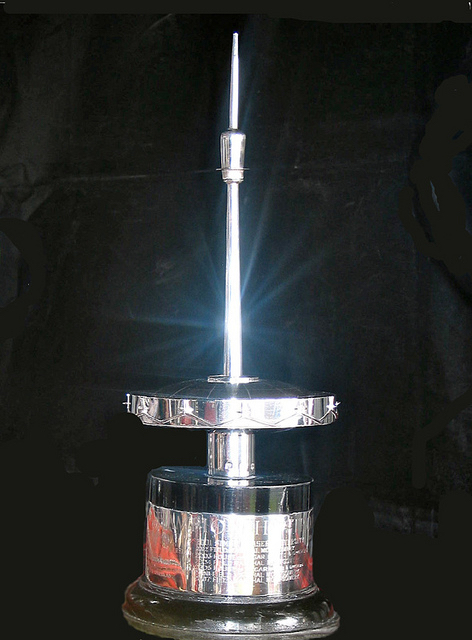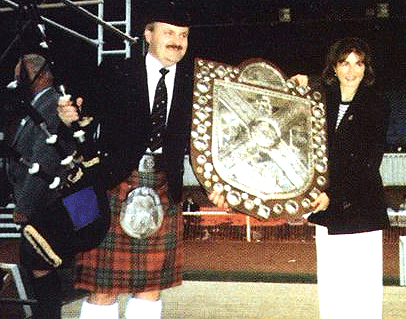Now a respected member of the RSPBA’s Adjudicators’ Panel, P/M Robert Mathieson won no less than five World Grade 1 Pipe Band Championships in his highly successful career at the helm of Shotts & Dykehead. Here we run the second part of the interview he gave to Pipe Band Magazine after winning his third in 2000. It will be of great interest to everyone aspiring to similar success. Robert is pictured above after winning his second title in 1997……………
 ‘We practice as a unit most of the time. If the pipe corps is playing on its own it is to do work on the pipes. We very rarely play as a unit without drummers.
‘We practice as a unit most of the time. If the pipe corps is playing on its own it is to do work on the pipes. We very rarely play as a unit without drummers.
On the Wednesday night [of Worlds Week] at the concert in Glasgow, I felt it was all coming together. In my experience if you are going to win the championship you will win it a couple of times in the practice hall, but this year at the concert, when we played our medley, I felt we had something. We had the reeds we were going to play at the Worlds in that night. I wasn’t worried about damaging them in any way because the concert was really the equivalent of a night’s band practice.
We also were very careful about how long we played at the concert. There was no point in leaving our best tone on the stage. I knew on the Wednesday night that the reeds could produce the sound. I would say that the concert was a major contributor to our success at the Worlds. Some bands don’t like doing it because it takes the focus away from the Worlds, but this wasn’t a full concert, it was quarter of a concert. Three other bands took part remember.
In Worlds week, it is important that you let the band members know that things are on track. When you are putting in new reeds two weeks before you are not necessarily producing a championship sound and people can be on edge. That’s when I have to do a bit of reassuring that the sound will come up on time.
Our whole winter was focussed on producing a medley for the Worlds. lt was made up of old tunes and new tunes with other members contributing as well as myself. I’ve encouraged that because I’ve been writing for so long in a format for the band. Musically we’ve gone down a specific channel and we can’t turn back. I can’t keep producing tunes. They begin to sound the same. I will edit the tunes to suit the medley however.

Sometimes pipers come up with tunes of six or eight parts which are just too long. We also have to make sure there is space in the tune to put in the drumming. The most important thing about a medley is that it sounds like one piece of music: it is more than a selection of tunes stuck together. It has to have an opening tune, a centrepiece and a finish. It has to have places in the medley where each section of the band can come to the fore. That might be snares, bass section, harmonics or pipes. That has to happen separately and not together. You can’t have drumming playing aggressively against a melodic tune.
‘The most important thing about a medley is that it sounds like one piece of music…..
A pipe major has to harness the strength of his band. In Shotts, we’ll play a tune which is drum driven but not for the whole medley. You have to play something melodic after it. Some of these ‘rhythm’ tunes sound pretty poor on a single bagpipe, but with the snares it works because they are driving the tune along and the pipes are accompanying them. The bass section might come to the fore then, and at that point the snares have to take a step back. Nine times out of ten I’m hearing bands, and I’m not necessarily talking about the top bands, where the snare section is up there, aggressive for the entire performance. I don’t hear the drumming reflecting the different moods of the tunes.
On the Thursday before the Worlds we didn’t play a lot because we had to deal with the aftermath of the concert. Everyone was tired and a bit hyped up. We did a lot of work on the MSRs on the practice chanters. We play all together and occasionally a piper will go one to one with me to make sure he or she is playing in the same style. We have a lot of good players in the band, probably the best pipe corps we’ve had in a long time. I’m talking about players like Graeme Roy, who’s just won the Silver Medal, Andrew Mathieson, Paul Ritchie. Margaret Houlihan.
‘A pipe major has to harness the strength of his band…..
These people definitely have their own way of playing but there is no room in the band for that. Fortunately our top players see things that way and most of them play two sets of pipes: one for solo and one for the band. They get as much attention in changing styles as the weaker players. It is sometimes harder to make a good player play the style you want than it is to change a poorer player.’
• To be continued. Read part 1 of Robert’s interview here. Check out the full list of Worlds winning pipe bands here.















Recent Comments